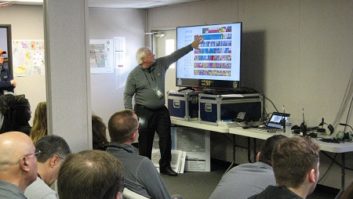Management and engineering as allies
Oct 1, 2001 12:00 PM, by Jim Paluzzi, CBT
The old joke goes: How do you make sure that you never get trapped in management? The punch line follows: become an engineer! Not long ago, this joke was dead-on accurate. Even today, while many engineers have risen in the ranks of broadcast radio, many in our field still hold on to the sentiment that engineers are generally ill-suited to working amiably with senior management.

The stories of about engineers toting pocket-protectors notwithstanding, most of the stereotypical images of broadcast engineers have a basis in fact. Many engineers spent their time learning about electronics instead of working on their communication skills. It is easy for engineers to resent the long hours, the pressures of being on-call around the clock, and the relatively little appreciation received for keeping the station on the air. Passive aggression thrives in this climate of resentment, and passive aggressive personalities are hardly to be considered allies in management.
Why does broadcast management need to be integrated with broadcast engineering? Radio is a complex industry, combining seemingly disparate departments to make great programming emerge from those radio speakers. The greater the diversity of staff members who see the big picture, the greater the probability of success.
Every general manager has his strong suit. For some GMs, programming is everything. Other general managers cut their eyeteeth in broadcast sales. Still others come from news. Since most general managers come from fields other than engineering, it is logical that these managers will place a higher priority on the issues they understand, rather than deal with strange and unfamiliar scenarios coming out of the engineering department. In short, we tend to play to our skill set, minimizing the importance of those areas where we have little experience.
Minimizing the importance of any segment of broadcast radio can be serious. However, when engineering investments are minimized, the results can be costly. Failure to invest in spare parts, for example, can often result in even higher costs to air freight the needed part in an emergency. Furthermore, since many critical broadcast components are unique (often custom fabricated), the lag time needed to secure and ship those parts can result in extended outages that can be both painful and expensive. The resentment in engineering that can result from ignoring a reasonable request for spare parts continues the downward spiral that makes it feel like engineering and management are adversaries, rather than allies.
Working together
Management and engineering can develop a tight, integrated team � but it takes work. Here are four steps that both managers and engineers can take to build an alliance:
Take time to ask questions. Since engineers and managers often come with vastly different backgrounds, neither party can know with certainty whether the other side is pulling a fast one. As a result, many managers fear the worst and assume that they are about to become a victim of their own ignorance � and the engineer’s questionable intent. Little good can come from this environment of mistrust. That is why radio stations must create an environment where both managers and engineers are encouraged to ask questions whenever there is a possibility of misunderstanding.
There are few issues in broadcast engineering that are so complicated that they cannot be expressed in terms that a competent manager can understand. The key is for managers to be persistent in asking follow-up questions until they are confident that they understand the issues. Likewise, when management makes a decision that makes little sense to the engineering staff, the engineers must take the responsibility to ask questions of management until the reasons behind the decision are clear. Both managers and engineers must learn how to ask non-threatening questions.
Kick the tires. Nothing impresses engineers like managers who care enough to get their hands dirty. One way to get into the engineering camp is to spend time inspecting engineering projects. Whether it’s a new studio, a new antenna site, or simply an old transmitter that has seen better days, managers gain a better understanding of an engineering problem by seeing the problem firsthand.
Share the suffering. Broadcasting rarely has genuine emergencies in the areas of sales or accounting. However, the business is full of engineering emergencies. These problems rarely occur during standard working hours (broadcast equipment prefers to fail on weekends, nights, and holidays). The simple act of having management present during a weekend repair session � or even during those Sunday night preventive maintenance drills � could go far in convincing engineering that management gets it.
Seek out positive interaction. Look for multiple opportunities for management to talk with engineering staff when technical support is not being requested. This means taking time to engage engineers in discussions about general subjects. Topics can range from simple small talk to in-depth discussions of management’s strategic vision for the station.
Task management
At some stations, the only contact some engineers receive from other staff members is a request � or a demand � to fix something. Often, that �fix it� request does not even require engineering skill. Amazingly, many engineers get routine requests to repair refrigerators, desk drawers, toilets, and slow-draining sinks. Some engineers are even called upon to render routine janitorial service.
No job should be too menial for any member of a successful broadcast team. Most engineers are more than willing to go the extra mile to do whatever needs to be done at a station. Nevertheless, management will find engineering a reliable ally in getting the job done only if the engineers believe that they are respected professionals on the broadcast team.
Jim Paluzzi is general manager of KBSU in Boise, ID, and professor of broadcast technology at Boise State University.











